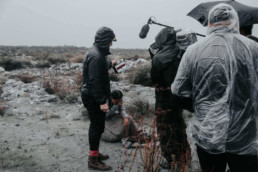EMS and Audible Magic Tackle Industry-Wide Issue of Verifying Music Rights Ownership
Audible Magic’s RightsRx enables EMS to proactively protect artists from fraudulent ownership claims
Los Gatos, Calif. – Nov. 17, 2020 – The Encoding Management Service (EMS), a technology service provider for digital music, audiobooks and eBooks, announced it has partnered with Audible Magic, the gold standard for content identification and leading provider of rights management and automatic content recognition (ACR) solutions. EMS is using Audible Magic’s RightsRx™ to prevent an industry-wide concern of fraudulent ownership claims by bad actors, attempting to steal revenues from the legitimate artists and rightsholders.
“There’s no question that Audible Magic is the partner of choice to help strengthen our rights management procedures, given their industry standard trusted and proven technology,” said Chris Bornefeld-Ettmann, EMS managing director. “We’re thrilled at how easily and quickly we implemented RightsRx into our existing workflow.”
Audible Magic’s RightsRx enables EMS to resolve ownership conflict claims prior to upload by identifying fraudulent submissions, as well as catalog conflicts when artists submit through multiple distributors.
“EMS is a major industry player and their effort underlines the continued trend of distributors proactively managing their catalogs to prevent unauthorized music from entering the digital music ecosystem,” said Vance Ikezoye, president and chief executive officer at Audible Magic. “We’re the best solution in the industry to ensure distributors can keep their catalogs clean from unauthorized content.”
Every month, Audible Magic searches billions of files looking for copyright content registered by over 140,000 record labels and music publishers. Its comprehensive reference registry contains tens of millions of registered works representing music from over 150 territories, with hundreds of thousands of new tracks added each month. Search results operate on files as short as five seconds and typically complete in one second or less, with virtually zero false positives.
For additional information, visit https://www.audiblemagic.com/rightsrx/.
About Audible Magic
For more than 20 years, Audible Magic has innovated solutions to identify content, manage rights, and monetize media. Audible Magic’s Emmy-winning automatic content recognition (ACR) technology powers billions of transactions monthly. The Silicon Valley pioneer is the trusted intermediary among rightsholders (including labels, studios, distributors, publishers, and collectives) and major platforms. For more information, visit https://www.audiblemagic.com/.
About EMS
The Encoding Management Service - EMS GmbH is a technology service provider for the digital entertainment industry. For more than 10 years now, EMS’ logistical solutions for digital contents enable fast and secure ripping, encoding and delivery of audio, video and eBook data to online retailers, aggregators and other services worldwide. EMS is one of Spotify’s recommended Delivery Platforms and listed Encoding House with Apple. EMS’ clients’ roster includes renowned distributors such as GoodToGo, Indigo, mbassador, TBA, Tonpool Digital, wordandsound and ZEBRALUTION. EMS is a member of the ZEBRALUTION Group since July 2019.
Contact:
Adriana Saldaña
Sterling Communications
[email protected]
+1 408-395-5500
7 Hard but Very Telling Questions for Your Automatic Content Recognition Vendor (ACR)
Consider These Issues to Avoid Costly Mistakes
Whether you are focusing on copyright compliance or licensing content for UGC, the choice of an automatic content recognition vendor may seem ancillary to your platform; the reality is that it is a crucial decision for your business. Choosing the wrong vendor can be costly and limit your ability to grow, significantly degrade your user experience, expose your service to large volumes of takedown notices, or worse.
Finding the right ACR vendor that will help you meet your compliance and licensing needs involves quite a bit of research. You may have spoken with colleagues, combed through several vendor’s websites, and possibly met with the sales representatives. Before you sign on the dotted line, there are a few key and often over-looked questions that will drive your decision.
1. Does the ACR vendor have a customer list? Are they the vendor of choice for the top platforms in the world?
Audible Magic’s customer list is a who’s who of the UGC sites both in social media and music distribution, including such services as Facebook, Instagram, Twitch, Vimeo, CD Baby, SoundCloud, The Orchard and Dailymotion, and many, many others.
Rightsholders recognize this and work with us to manage the appropriate use of their content. The list of rightsholders who proactively register with Audible Magic consists of over 140,000 music labels and over 1000 video suppliers across the globe. Our registry includes content from industry leaders such as Universal Music Group, Sony Music Entertainment, Sony Pictures, CBS/Showtime, Disney, NBC Universal, Warner Music Group, FOX, RTL Group, Grupo, and Canal+.
2. How does your vendor mainly acquire their customers?
Audible Magic is proud and humbled that we have built a business on unsolicited references from rightsholders and platforms. We continue to earn this praise through continued technical innovation and proven performance over many years.
3. Are you interested in a transactional relationship, or are you looking for a trusted advisor that is experienced and understands the latest regulatory changes?
At Audible Magic, we bring 20 years of experience with all types of business models. We have long-term relationships with key players in the industry and understand the challenges of compliance and licensing. We have top players on our team from the industry with extensive knowledge of rights management as well as an understanding of automatic content identification. With each identification, we understand that we are helping you make decisions that will impact your business.
Although you may think you are only buying a transactional service with Audible Magic, you are gaining access to a team with in-depth industry knowledge that can guide you through issues such as the recent changes in the EU Copyright Directive (aka, Article 17).
4. Will you have access to a support team or a bot?
Audible Magic has an experienced team of customer support analysts here to support you via phone or email 24/7 if needed.
5. Do you want a vendor that has been working to build a trusted bridge between platforms and rightsholders, or do you want a vendor that has been servicing only rightsholders?
Audible Magic has been building a trusted bridge between the rightsholders and the platforms by providing services that bring clarity to the use of audio and video. Other vendors come from a very combative history in the industry. As a platform, what kind of vendor do you want to hire? At Audible Magic, you are our customer, and because of our position in the industry, we provide a balanced bridge between rightsholders and UGC services.
6. Does the solution sound too general-purpose or feel too slick? It probably is.
We deal with many types of platforms with different business models and have found that a one-size-fits-all solution, well, doesn’t get the job done. We work with our customers to provide the best result for their specific needs, resulting in extremely high accuracy rates and at extremely high volumes (hundreds of millions of transactions per day).
The ability to provide highly accurate identifications allows your business to grow without human intervention, constantly reviewing misidentified files. You’ll want a service that minimizes the impact on user experience. Imagine telling a user that the file he just uploaded includes unauthorized copyrighted material, and it actually doesn’t. That happens with solutions with other vendors and is extremely rare with Audible Magic’s technology.
When it comes to licensing, some customers need to administer directly licensed deals, while others need sub-licenses. Your ACR vendor should be flexible enough to meet your needs for compliance, licensing, and reporting.
7. New is not necessarily better. Do you want to entrust the future of your business to unproven technology or business acumen?
Audible Magic has assembled an innovative and experienced team that has kept pace with the latest developments in the industry, whether it is short clip length or creating a solution to identify covers. Our ever-growing list of patents (51 and counting) shows we mean business when it comes to innovation. Twenty years doesn’t mean staid. It means we have successfully, over the last two decades, met the challenges our customers continuously bring us.
Will the Implementation of the EU Copyright Directive Be Delayed?
We live in unprecedented times. The COVID-19 pandemic has affected governments worldwide, including the member states of the European Union, as they shift their focus from day-to-day legislation to battling the outbreak. According to several news sources, including a recent Politico article, transpositions of the new EU Copyright Directive of which Article 17 is a part will be slowed. For example, France has partially adopted the new Directive but the implementation of Article 17 will now not happen in France until the third or fourth quarter of 2020.
As Andrus Ansip, the former European Commission vice president for digital commented about the transposition of the Directive in a recent Politico article, "It will take some time for the directive to be implemented in all member states. Because of the coronavirus crisis, I think not so many people are thinking about copyright". The crisis has also impacted the stakeholder dialogues, which will help define guidelines for implementation of the Directive across the EU. The seventh meeting was scheduled for March 30th but was postponed by the European Commission due to the crisis.
Several Countries are Close to Adoption in 2020
Although we cannot predict the future timing of each country, this interruption will only be temporary.
- It is likely that France and Italy, and possibly also the Netherlands and Denmark, will have completed the transposition before the end of 2020, with the remaining countries due to do so before the June 7, 2021 deadline.
- Some member states have reportedly requested the European Commission to suspend enforcement proceedings against member states who are currently in default of their obligations to transpose other, earlier Directives. The Commission does not appear to have responded to these requests but is unlikely to start enforcement proceedings against any member state while the current situation lasts.
- The situation in Italy should be closely monitored. The Italian government intends to transpose the Directive by Decree before the end of the year. In recent cases, Italian courts ruled that even before the Directive comes into force, platforms are directly liable for making available content uploaded by users and have awarded substantial damages. Transposition of the Directive in Italy will give platforms the benefit of a new safe harbor if they comply with the requirements of Article 17(4).
It is highly likely that the Copyright Directive will already be law in several European countries before the end of 2020.
The June 2021 Deadline Still Applies
This delay does not change the June 2021 deadline for EU states to adopt the Directive into law. This is fixed in the law, although it is possible that the European Commission may be flexible when it comes to enforcing this deadline.
Plan Now
It is important to start planning now on how to meet the requirements and understand the impact of the Directive on your business.
Below are some resources to help you understand the Directive and how it may impact your business.
- Take our A17 Assessment Survey for platforms to assess if the Directive affects your company and then assess your readiness to comply
- Learn more about the impact of the EU Copyright Directive on live streaming platforms
- Understand how small social networks will be impacted
- Read the full text of the Directive
- And more is available on our Article 17 page as well as in our blog section
Audible Magic Review: An Article on Live Streaming and the New European Copyright Directive
Whether you agree with the new European Copyright Directive or not, an objective of the Directive was to ‘clarify’ the definition and obligations of online content sharing service providers (“OCSSP”). One area which remains unclear, however, is the application of the Directive to ‘live streaming’ platforms – which in these times are becoming an increasingly significant category of media.
A new article by one of Europe’s leading copyright law experts, Dr. Eleonora Rosatii, examines live streaming services in the context of existing EU copyright law and the new 2019 EU Directive on Copyright.
Conclusion: Live Streaming Platforms Classified as OCSSPs
Dr. Rosati’s analysis concludes that live streaming platforms fall within the definition of an ‘online content sharing service provider’ under the new 2019 EU Directive on Copyright in the Digital Single Market (The Copyright Directive). These platforms can, therefore, be held directly liable for copyright infringement by making infringing streams, initiated by their users, available to the public.
In this respect, the Copyright Directive does not materially alter their position as it stood under EU law prior to the Directive being passed. What is different, is Article 17 provides live streaming platforms protection from liability, if they make best efforts to get licenses and take measures according to high industry standards to ensure the non-availability of infringing content via their platform.
Summary of Analysis
Given the huge spike in live streams of DJ sets during the COVID-19 pandemic, this timely article looks at live-streamed performances and notes that, if the performance had taken place in a public venue, the venue would have been required to obtain copyright licenses.
Dr. Rosati examines the situation of a hypothetical Platform X: DJs upload live streams of their performances which include the playing of copyright sound recordings. Platform X stores the material only for so long as necessary to enable the uploads to be transcoded and then streamed to an audience of frustrated would-be club-goers. Storage is therefore ephemeral, and no copies of the DJ sets are stored for future on-demand streams or downloads. The live streams are indexed by the platform, enabling would-be listeners to search and find streams or DJs they like.
The author explores the platform’s direct liability under the principles of existing EU law for making user-generated content available to the public. These principles were developed in successive cases decided by The Court of Justice of the European Union, culminating in the express finding of direct liability in the 2017 decision in Ziggo (the Pirate Bay case)(C-610/15). The precise nature and scope of this liability remains uncertain as evidenced by the number of CJEU referrals currently pending in this area (YouTube, C-682/18; Elsevier (C-683/18); Stichting Brein (C-442/19); and Puls 4 TV (C-500/19)).
Dr. Rosati says that it is not surprising that the Copyright Directive is characterized (in Recital 64) as a ‘clarification’ of existing law. She points out that where Article 17 goes beyond the pre-2019 EU copyright regime, it is not in the direct liability of OCSSPs for acts of communication or making available to the public, but in the regime that it establishes around that potential liability.
The article also examines whether a live streaming service can be considered an Online Content-Sharing Service Provider (OCSSP). Article 2(6) of The Copyright Directive defines an OCSSP as an online service, one of whose main purposes is “to store and give the public access” to large amounts of copyright content which it “organizes and promotes for profit-making purposes.” The issue is whether the ephemeral nature of the storage disqualifies the live streaming platform from being classified as an OCSSP. Rosati examines this question in-depth in the context of the Copyright Directive and the E-Commerce Directive and concludes:
“Live streaming providers that behave like Streaming Platform X in the example above are to be regarded as OCSSPs, even if the storage made of user-uploaded content is limited in time. What is relevant for the qualification of a provider as an OCSSP in principle is the purpose that it pursues (to store and give the public access to a large amount of protected subject matter uploaded by users) and, with that, the role that it performs (organization and promotion of such subject matter for profit-making purposes), not the duration (e.g., permanent or temporary storage of protected content) of the activity at hand.”
Dr Rosati concludes that the activities of the live streaming platforms are therefore governed by Article 17(4) of the Copyright Directive, and because of that, OCSSPs can protect themselves from liability, if they make efforts to obtain licenses for the content, and in the absence of any license, use best efforts, according to high industry standards, to prevent the availability of unlicensed content contained in the live streams. In conclusion, if live streaming platforms are classified as OCSSPs, the new Copyright Directive provides them a new ‘safe-harbour’ from liability provided they meet their other Article 17 obligations.
Commentary: Platforms Benefit from Safe Harbour as 2019 Copyright Directive OCSSP
The relevance of this article to live streaming platforms is clear and the implications are significant. Any live streaming service that gives public access to large amounts of copyright content uploaded by users, which it organizes and promotes for profit-making purposes, can be held directly liable for copyright infringement. This applies to both pre- and post- 2019 EU Copyright Directive regimes.
Prior to the Directive, even if a live streaming platform tried to get licenses and employed content recognition technologies to prevent unlicensed uploads, the platform would be liable for any infringing content that managed to get uploaded to its platform.
The new Copyright Directive changes that: The platform can now protect itself from direct liability by taking the steps prescribed in Article 17(4). These include using best efforts, according to high industry standards, to ensure the non-availability of content, in respect of which the copyright owner has provided relevant and necessary information.
_______________________________________________________________________________________________
[i] Associate Professor in Intellectual Property (IP) Law at Stockholm University; Guest Professor at CEIPI-Université de Strasbourg; Research Associate and Lecturer at EDHEC Business School; Associate at the Centre for Intellectual Property and Information Law at the University of Cambridge; Of Counsel at Bird & Bird; and Editor of the Journal of Intellectual Property Law & Practice (Oxford University Press, peer-reviewed). Dr. Rosati holds law degrees from the University of Florence, an LLM from the University of Cambridge, and PhD from the European University Institute.
Audible Magic Corporation Review is issued for informational purposes only and is not intended to be construed or used as general legal advice. Please contact the author(s) or your Audible Magic Corporation contact if you have questions regarding the currency of this information.
For more than 20 years, Audible Magic has innovated solutions to identify content, manage rights, and monetize media. Audible Magic’s Emmy-winning automatic content recognition (ACR) technology powers billions of transactions monthly. The Silicon Valley pioneer is the trusted intermediary among rights holders (including labels, studios, distributors, publishers, and collectives) and major platforms.
Audible Magic is a service mark and trade name of Audible Magic Corporation ©2020 Audible Magic Corporation. All rights reserved.
Plan Now
It is important to start planning now on how to meet the requirements and understand the impact of the Directive on your business.
Below are some resources to help you understand the Directive and how it may impact your business.
- Take our A17 Assessment Survey for platforms to assess if the Directive affects your company and then assess your readiness to comply
- Understand how small social networks will be impacted
- Read the full text of the Directive
- And more is available on our Article 17 page as well as in our blog section
Audible Magic Continues to Support Customers During the COVID-19 Outbreak
The health and safety of our community, customers, partners, and employees are our top priority. As of Monday, March 16th, all of our employees in both the Los Gatos and London offices are working remotely — we have suspended all non-essential work-related travel. We are continuing to monitor recommendations from the CDC and the World Health Organization to remain up-to-date on the latest information and safety protocols.
We anticipate no disruption to our service during this time. All our teams will remain fully operational and will continue to provide the highest quality service and support to our customers and partners.
As always, you can contact Audible Magic support by emailing [email protected] or submitting a ticket on our support page: https://support.audiblemagic.com/hc/en-us.
Stay safe, and together we will get through this challenging time.
Vance
President and CEO
Audible Magic
Audible Magic Launches AMLive™ to Protect Against Rebroadcasting Premium Content by Users of Live Streaming Platforms
Los Gatos, CA (April 3, 2018) — Audible Magic Corporation, the leader in audio and video digital content identification solutions, announced today the availability of AMLive — a new service to identify unauthorized user streams of premium content registered by rights holders. The service addresses industry needs to protect live sports, live-broadcasted music and other premium content. AMLive operates on both live streams and video-on-demand.
Using a simple dashboard or via an API to integrate into existing workflows, AMLive makes it easy for broadcasters and programmers to register live broadcast events. Once content is registered with Audible Magic, the social platforms can automatically identify and block unauthorized streams in real-time.
“Content owners can now more easily ensure their valuable content is available only from authorized streaming services.” said Vance Ikezoye, Co-founder and CEO of Audible Magic. “AMLive is well suited for the live sports industry, where piracy of live streams is a major concern. The service also addresses a growing issue where recorded music is streamed live by bedroom DJs.”
“What makes Audible Magic unique in the industry is we provide a service used and paid for by the social platforms to proactively prevent the unauthorized distribution of copyrighted content. The social platforms then make the service available to any content owner who wants to register content they own or control. AMLive enables greater cooperation between the social platforms and the content industry.”
Audible Magic is recognized for its pioneering work in audio and video digital fingerprinting, the foundation behind its content recognition technology, and is a trusted provider among both platforms and rights owners. With the launch of AMLive, Audible Magic expands its portfolio beyond video-on-demand (VOD) services.
Audible Magic will be discussing AMLive and other recent developments with content owners and OVSPs at the National Association of Broadcasters show in Las Vegas, April 9-11. Please contact [email protected] to schedule a meeting.
Additional information on AMLive can be found at http://bit.ly/ampr318
Trident Embeds Audible Magic Digital Fingerprinting into Digital TV Platform
OEMs and Application Developers Can Easily Offer New Capabilities for Social TV, Direct Ad Response, and Personalization
LOS GATOS, CA and SUNNYVALE, CA, August 29, 2011 - Audible Magic today announced that Trident Microsystems has integrated its SmartID automated content recognition system onto its digital TV (DTV) platform. Based on Audible Magic's patented digital fingerprint content identification technology, the SmartID system will help Trident OEMs and ODMs and their application developers more fully capitalize on new opportunities in the emerging social TV, interactive advertising, and personalization markets.Read more
Audible Magic Rolls Out Beta Phase of New myRightsView™ Copyright Identification Service
LOS GATOS, California — October 19, 2009 —Copyright registration of music can now be easily verified using Audible Magic’s new myRightsView registration service (www.myrightsview.com). Featuring an easy-to-use interface, the new service is available to anyone who wants to ensure appropriate ownership for royalty, licensing, anti-piracy or use purposes.Read more
MonitorLatino.com to Monitor All Spanish Radio Stations
Mass Radio Inc. and Audible Magic Corp. Join Forces to Launch Radio Tracking Data Powerful New Spanish Radio Monitoring Service
LOS ANGELES, California — September 22, 2004 — Mass Radio Inc., a leading Hispanic radio consulting company, will launch Radio Tracking Data, a new and powerful Spanish radio monitoring service. This new service will monitor more than 600 Spanish radio stations in the United States as well as major cities in Mexico. Radio Tracking Data will use MonitorLatino.com as the official website to provide complete monitor information.Read more
SESAC Broadcasts its Use of CMJ’s RAM Service to Assist with Royalty Distribution
Service Powered by Audible Magic’s Patented Digital Audio Identification Technology
LOS GATOS, California — August 27, 2003 — The CMJ Network and Audible Magic have announced that SESAC has become the first corporate customer to utilize data from CMJ’s Realtime Airplay Metrics (RAM) airplay reporting service. RAM, the first service to comprehensively track airplay on college, non-commercial and “early-adopter” radio, utilizes Audible Magic’s patented digital audio identification technology. In light of its 25-year artist discovery and development mission, RAM is a natural evolution to CMJ’s growing platform of media, event and data-centric products and services. SESAC, one of the three major performing rights organizations in the USA, will utilize RAM data in its monetization of non-commercial radio and its ongoing effort to improve the accuracy of performance royalty distributions to songwriters and publishers.Read more











